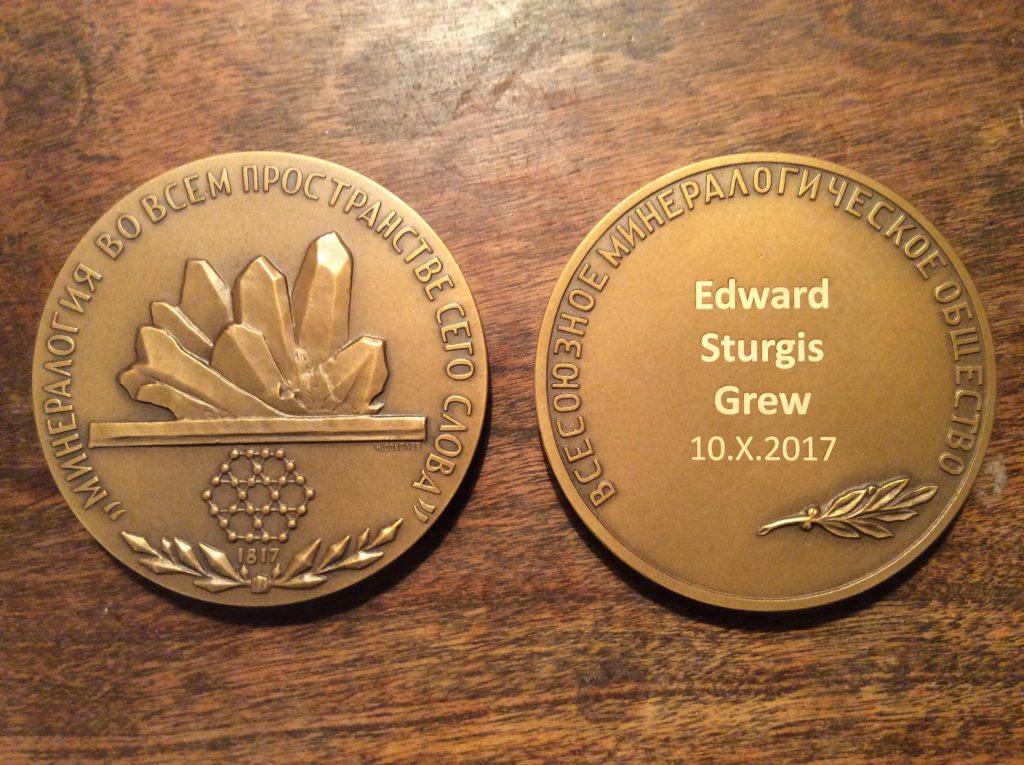UMaine mineralogist elected as Foreign Honorary Member of Russian Mineralogical Society
The Russian Mineralogical Society (RMS) elected Edward Grew, a University of Maine research professor, as a Foreign Honorary Member. The society, founded in 1817, is the oldest of the national mineralogical societies in the world and is highly selective in designating the prestigious honor. Only 18, including Grew, have been elected as Honorary Members from the United States since 1817.
The election was held at the bicentennial meeting of the RMS in St. Petersburg, Russia on Oct. 10. Throughout its 200-year history, RMS has elected a total of 145 Foreign Honorary Members from around the world, including such prominent scientists as Johann Wolfgang von Goethe, Charles Lyell, Alexander von Humboldt and René-Just Haüy.

Grew was recognized for his contributions to the field of mineralogy, and his longstanding partnerships with Russian mineralogy and mineralogists have been highly appreciated by the society. He joins Peter Wyllie of the California Institute of Technology, Peter Burns of the University of Notre Dame and Robert Hazen of the Carnegie Institution for Science as the fourth current RMS Foreign Honorary Member in the U.S.
Grew began learning to speak Russian while studying at Dartmouth College and later, while working on his Ph.D. at Harvard, lived with a Russian family and spoke the language in their home. Spanning the years of 1972 to 1974, Grew spent 16 months in Antarctica on a winter-over exchange based at the former Soviet research station Molodezhnaya. Totally immersed in the Russian language, he traveled widely throughout East Antarctica.
“Because I had studied Russian, I was able to fully appreciate the experience offered by participation in the Soviet expedition to Antarctica that launched my scientific career,” Grew says.
Grew participated in several more Soviet Antarctic Expeditions — one to the Shackleton Range in 1976–1977 and another to the Northern Prince Charles Mountains in 1984–1985. Through former U.S.–U.S.S.R. Interacademy Exchange programs, he did fieldwork in the Aldan Shield of Siberia in 1987 and in the southwestern Pamir Mountains of Tajikistan in 1990. In 1995, several of Grew’s Russian collaborators visited UMaine, which served as base for mineralogical field trips.
“Knowledge of Russian opened up many career opportunities,” Grew says. “My interest in foreign languages began at a young age. My father was head of the French Department at Phillips Academy Andover, and being able to converse in French was de rigueur in my family. My parents encouraged us to learn about other countries through their languages.”
In 2012, Russian mineralogists Evgeny Galuskin and Irina Galuskina named two newly discovered minerals after Grew, edgrewite and hydroxyledgrewite, which they found in the rocks of the Northern Caucasus in the Kabardino-Balkaria Republic in Russia.
Over the past 45 years, Grew has published numerous papers with Russian co-authors and continues to work on mineral evolution research with his Russian colleagues.
“I have always enjoyed wonderful support at the University of Maine for all my international geological expeditions and research. Election to Honorary Membership by the Russian Mineralogical Society was a lovely surprise and deeply touched me,” he says. “I am more grateful than I can say.”
Foreign Honorary Membership in the RMS is the third major international award for Grew. In 2015 he was awarded the Collins Medal by the Mineralogical Society of Great Britain and Ireland, and in honor of his 70th birthday, the Mineralogical Association of Canada published a special issue of the journal Canadian Mineralogist with 12 papers by 63 authors representing many of his scientific colleagues from around the world.
